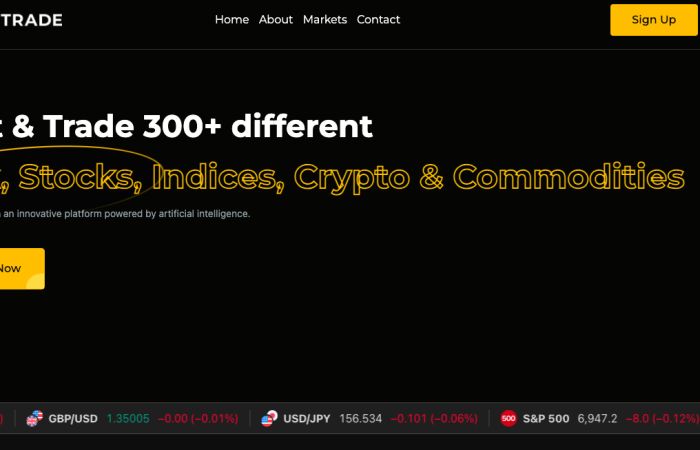
Quopi.app presents itself as an AI-powered auto-trading platform that automates buying and selling processes, promising profitability daily. This bold claim suggests that users can consistently achieve financial gains without manually managing their trades, which, if true, could revolutionize personal trading strategies. However, as enticing as these assertions may be, our initial investigation into Quopi.app has unearthed several red flags concerning its auto-trading functionalities.
These concerns raise questions about the platform’s effectiveness and reliability. Potential traders considering Quopi.app for their investment activities should know these issues. This review aims to delve deeper into the workings of Quopi.app, providing a clearer picture of what traders might realistically expect and whether the platform is as reliable as it claims to be.
Overview
Quopi.app, launched on December 14, 2023, positions itself as an AI-driven auto-trading platform catering to the needs of cryptocurrency traders. Despite its modern appeal, a closer examination reveals several significant compliance and operational concerns that potential users must consider.
Firstly, Quopi.app is not regulated under any recognized financial regulatory framework. This lack of oversight means the platform does not adhere to standard financial rules such as Know Your Customer (KYC) verification and Anti-Money Laundering (AML) protocols. Such non-compliance can expose users to risks, including fraud and potential legal consequences.
Additionally, Quopi.app lacks transparency about its operations. There is no ‘About Us’ section on the website, and no information is provided about the company’s CEO, team, or other critical organizational details. This absence of foundational information is a red flag for any financial service provider, as it hampers users’ ability to verify the legitimacy and credibility of the platform.
The platform’s exclusive acceptance of cryptocurrency deposits and the absence of company bank accounts further complicate its trustworthiness. Moreover, the mention of depositing funds into unknown bank accounts as an alternative raises serious security and legitimacy concerns. This practice is unusual and could potentially be a scheme to bypass regulatory scrutiny while accessing user funds.
Given these findings, individuals considering Quopi.app for their trading needs should exercise caution. Thoroughly investigate the platform’s legitimacy and consider safer, more transparent alternatives.
Red Flags
Quopi.app presents several red flags that potential users should consider seriously before engaging with the platform. Each of these warning signs could indicate underlying issues with the platform’s security, legality, and overall reliability:
- Unregulated Platform: Despite its claims, Quopi.app operates without any regulatory oversight. This absence of regulation means the platform is not bound by any legal standards to protect investors, greatly increasing the risk of fraud and misconduct.
- Lack of Transparency: The platform fails to provide an ‘About Us’ section, essential for establishing trust and credibility. Without this information, users have no insight into the company’s management, its mission, or the background of its team, making it difficult to assess the platform’s legitimacy.
- Third-Party App Availability: Quopi.app offers a third-party trading application. Third-party apps can introduce security risks, especially if they are not properly vetted or request excessive permissions that could compromise user data.
- No Verification Processes: The Quopi app does not conduct verification checks on user signups or deposits and withdrawals. This lack of verification is a severe oversight that can lead to AML (Anti-Money Laundering) issues, potential financial fraud, and the platform being used for illegal activities.
- Hidden Ownership: The anonymity of the website’s owner is another significant concern. Transparency about ownership is crucial for accountability. When owners hide their identity, it often indicates they are avoiding liability or potential legal repercussions that could arise from fraudulent operations.
These red flags underscore significant risks associated with using Quopi.app. Potential traders should approach this platform cautiously, conduct thorough independent research, and consider more secure and transparent alternatives for their trading activities.
BBB Complaint About Quopi App
On March 29, 2024, the following complaint was filed with the BBB (Better Business Bureau) regarding a cryptocurrency scam at Quopi.app by a person who reported being scammed for $2,530:
I invested $2,000. Then, the system went down and later came back online. They told me I needed to deposit $250 to restore my account and the previous funds. Subsequently, I deposited approximately $255 in Bitcoin. They then claimed that cryptocurrency fees had reduced the balance below $250 and asked me to deposit more. I deposited another $275 in Bitcoin. After that, they demanded an additional $2,500. I attempted to withdraw the $247 in Bitcoin (the $255 less fees), but those funds disappeared along with the initial $2,000. The value of the Bitcoin has significantly increased, likely exceeding $3,000 in addition to the $500 deposited. I have supporting screenshots for these transactions.
Quopi App Review Conclusion
Quopi.app raises several significant red flags that should make potential users cautious about utilizing the platform for their trading activities. The lack of regulatory oversight means the platform operates without adherence to standard financial laws designed to protect users. Increasing the risk of fraudulent practices.
The absence of essential information, such as an ‘About Us’ section, details about the company’s leadership, and clear operational guidelines, further obscures the platform’s legitimacy and intentions. The use of third-party applications for trading and the lack of necessary verification processes for signups, deposits, and withdrawals expose users to potential security risks and compliance issues.
Coupled with the platform’s owner’s hidden identity, these factors suggest a high likelihood of risk and potential scams. Users should strongly seek alternative trading platforms that offer greater transparency, security, and regulatory compliance to ensure the safety of their investments.
If you are a victim of online scams, please let us know by commenting below, and if you have lost a significant amount of money, do not lose hope. We can help you recover your funds!


